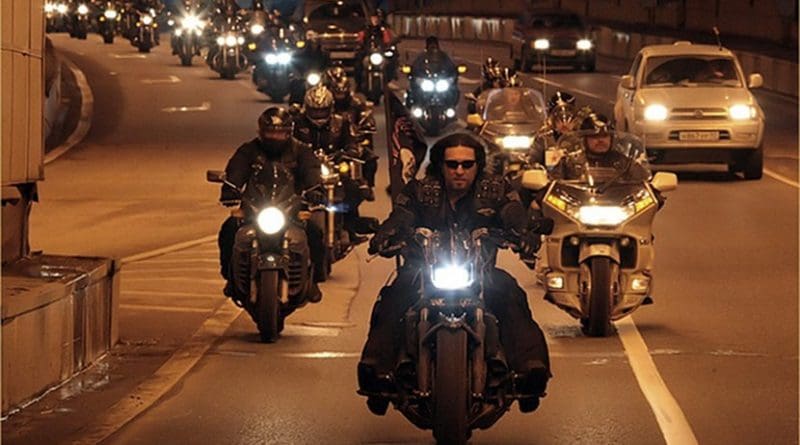Night Wolves: Putin’s Biker Pals Set Up Military-Style Camp In Slovakia
By RFE RL
By Yaroslav Shimov and Alan Crosby
(RFE/RL) — With the 50th anniversary of the Warsaw Pact invasion to rein in then-Czechoslovakia quickly approaching, one of the Kremlin’s boldest advocacy groups has set up a military-style “camp” outside the capital of NATO member Slovakia.
The Night Wolves motorcycle club, whose members were at the vanguard of Russia’s occupation of Crimea and nicknamed “Putin’s Angels” by the media, has taken residence at a former military base in Dolna Krupa, about 60 kilometers northeast of Bratislava.
The move by the club, known for promoting Russian nationalism, hatred of gays and feminists, and allegiance to the Kremlin, appears aimed at revealing a dark, anti-Western side of the European Union member, which has sizable far-right and Russophile elements.
The group, which has been hit with sanctions from the West over its support for pro-Russia separatists in eastern Ukraine, was established in Slovakia last month.
“They’ve come to irritate democrats and recruit people who are capable of shooting at Ukraine,” Slovak oppositionist and communist-era Charter 77 signatory Jan Budaj told journalists. “They’re bringing a message aimed at disrupting the EU and dissolving NATO.”
With an imposing 2-meter-high black wall topped with barbed wire surrounding the facility, few know what goes on inside.
But what is known via drone photos is that it houses tanks, armored vehicles, and police equipment.
According to the newspaper Hospodarske Noviny, the local branch of the Night Wolves is headed by Jozef Hambalek, who the newspaper says owns the property and is close to former Interior Minister Robert Kalinak. Neither has commented publicly on the base.
Hambalek is said to want to open a military museum in the complex.
But the military equipment is said to be owned by the Defense Ministry, which has suspended Miloslav Capalovic, the head of the Military History Institute, for allowing equipment to be rented by Hambalek.
“It is obvious that the head of the Military History Institute, Miloslav Caplovic, failed to thoroughly check on the background of this civic association, and thus, he exceeded his competences,” according to Defense Ministry spokeswoman Danka Capakova.
‘Beyond The Limits’
Police say they have been monitoring the group’s activities but that so far they’ve seen nothing illegal.
The Foreign Ministry has expressed concern, saying “the activities of group members need to be carefully monitored and evaluated.”
But Jaroslav Nagy, director of the Slovak Institute for Security Policy, warned against an overly lax approach to the matter.
“This is beyond the limits of the permissible…. Their actions are always as unequivocally propaganda actions,” he said in an interview with RFE/RL’s Russian Service.
The Night Wolves’ leader, Aleksandr Zaldostanov, has frequently appeared in public with Putin, and is known for his fiercely nationalistic statements.
He has led the group on a series of provocative rides before — including a Victory Day trip to Berlin and a candlelighting at Katyn, where Josef Stalin is said to have ordered the execution of tens of thousands of Polish officers during World War II.
More recently, though without Zaldostanov, nearly two dozen Night Wolves took part in what they called a “Russian Balkans” tour in March.
Earlier that month, Bosnia-Herzegovina’s authorities had banned Zaldostanov, who calls himself “The Surgeon,” from entering the country as he was deemed a potential threat to Bosnia’s national security.
Bosnia officials alleged the tour was aimed at intimidating non-Serbs in the divided country, where a 1992-95 ethnic war killed more than 100,000 people.
The tour also coincided with what Western intelligence officials say has been an increase in efforts by Moscow to expand its influence in the Balkans.
‘Paramilitary Bomber Unit’
In Slovakia, the Student Initiative group said it was so concerned over the situation that it has called a protest for July 27.
“We urge all citizens to come along with us to express our disapproval of having such an object on our territory, and to show together that the security of our country is not stolen,” said Timothy Lauko of the initiative, which uses the hashtag #niejenamtojedno — roughly meaning “it matters to us” in Slovak.
“The Night Wolves are known to be a paramilitary bomber unit directly supported by the Russian Kremlin. This motorcycle gang also echoes members who, along with the Prussian separatists, fight with our eastern neighbors in Ukraine,” he added.
Night Wolves members were among the spearheads of Russia’s covert invasion and occupation of the Ukrainian peninsula of Crimea in 2014, according to officials in Kyiv.
If many outsiders are worried about the current situation in Slovakia, it might be hard to say the same of nearby residents.
“They recently celebrated something [and] they behaved decently,” the Internet information website Topky.sk quoted one Slovak villager as saying. “Russian bikers also go here; there are no problems with them.”

